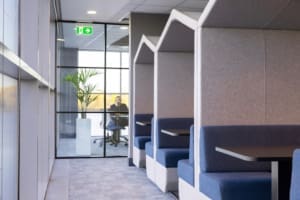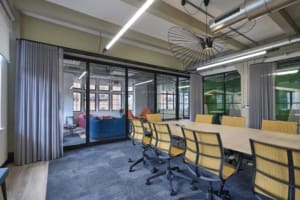The Pros and Cons of Office Relocation Should I stay or should I go?
With the commercial world changing, from working routines to business processes, we are experiencing more and more of our clients discussing whether an office relocation is a strategic move, or whether they should stay put where they are. These changes have put new demands on workspaces and have influenced business thinking in terms of space requirements.
Compared to ten years ago, commercial leases have seen a shift, where once we would see lease expiries and break clauses every decade, these are now often shorter, being as frequent as every three years or so. Understanding whether an office relocation is right for your business is unsurprisingly a difficult decision, there are many factors to take into consideration such as financial drivers and footprint needed to cater for and support your current employees, as well as ensuring the footprint is/ will be suitable for your future plans. There is no right or wrong answer when it comes to refurbishing or relocating, it is down to the individual businesses circumstances and comes down to what is best for your business and its people.
Determining the reasons for your potential Office Relocation
Understand your current lease
Understanding your current lease and position is the first aspect you should be thinking about when deciding whether to refurbish or relocate. Start by identifying how long is left on your lease, if your landlord has any plans for the building, if a break clause is an option, if there are any exit charges and whether you need to renegotiate the commercial terms on your existing lease with your landlord- if you are considering staying. However, renegotiating lease terms and having a discussion with your landlord might lead to some answers and give you a wider idea if you’re wondering whether to stay in your current building or relocate.
As an occupier, you should start planning 12 to 24 months in advance, giving you plenty of time to assess your situation, have those important conversations with your landlord, and address what it is you need moving forward. A break option can be easily missed in a busy world, giving some occupiers no choice but to stay, so understanding your current position as early as possible is important.
Drivers for change
The reason behind an office relocation is different for everyone, relocation doesn’t just mean upsizing though, it can also mean rightsizing (also referred to as downsizing) – in fact, companies are now typically taking 6% less space, we are experiencing some of our clients rightsizing and investing more in their office refurbishment, improving and focussing on employee wellbeing. There are also other reasons businesses may decide to take the leap of relocating, such as:
- ESG goals
- Financial
- Employee needs
- Footprint
- Lease renewal
ESG goals
There are now more green commercial buildings than ever before as the demand for these types of spaces rises. Occupying in green buildings not only supports internal ESG strategies such as net zero carbon targets, but some would also argue that it enhances brands and gives businesses that do so, a competitive edge. Our recently completed project Hedgehog Lab is the perfect example of this. Hedgehog Lab, who are working towards their B Corp certification this year and took the decision to relocate to Strawberry Lane, a building that has a strong focus on renewable energy and minimising environmental impact. Ben Johnson Interiors also completed the office fit out to a high standard, focusing on sustainable furniture, as well as reusing some existing.

Financial
Money is a huge factor when deciding whether to stay and refurbish or relocate your office space. In the short term, there is a cost involved with relocating office space. Considering the long term however, if you can secure a better lease term elsewhere this could save you money in the long run. Running costs are also another factor to consider, will relocating save you money on running costs? Is there a building that is more energy efficient? Relocating can be a huge financial outlay and there are many factors to consider, such as capital expenditure, staff downtime and business interruption. Although moving to a new office building might come with an initial cost, you can always find ways to save on moving costs.
Employee needs
Does your current office space have the sufficient facilities to meet your employee needs? Are your employees happy in the current office location? Do you have the required technology to be productive? Your current office space may need some tlc to improve facilities in order to enhance staff wellbeing, you may need to think about researching design and build contractor’s (like us!) to help you revaluate and utilise your office space better, therefore opting for an office refurbishment. On the other hand however, a new office location could provide the opportunity to create an upgraded, better work environment for all. Moving office location can come with a lot of stress, so organisation is key, there is no right or wrong way, it is down to individual needs. It is also worth thinking about the cons involved with both options, we have worked with many companies who have had employees still working in the office space whilst we have completed an office fit out or refurbishment, with minimal disruption. We completed a full office refurbishment and fit out for Keepmoat Homes in Doncaster, the office space was refurbished in two phases to help minimise disruption to the team, with a mixture of home working and the use of space on the 1st floor, which we weren’t refurbishing at the time.

Footprint
Changes in working patterns is one reason companies may need less space as not every employee comes into the office every day, instead they are utilizing the space better and taking less of it, to cater for the needs of their teams. So, by considering what changes have been made to your business gives a great indication as to whether you need to accommodate a growing workforce, or scale down due to changes in work patterns.
One of our existing clients, Circus PPC Agency, recently opted to take on a larger footprint in their existing building to accommodate a growing team, with future plans to grow their workforce even more. The move went smoothly for Circus and our client couldn’t be happier with their new, upgraded workspace! It wasn’t all change however- our client loved their original office design so much, they wanted to keep their new space in line with their old, but on a larger scale. On the other hand, however, we are experiencing more and more businesses ‘rightsizing’ and offering their employees more, in a smaller space.

Lease renewal
Lease renewals are a key driver for change because it gives businesses a real opportunity to evaluate what is going to work for them in the future. If you do need/want to renegotiate, understanding the terms in your lease is important. If you opt for a relocation however, planning in advance is crucial.
Moving office location could be the right choice for your company, but it is important to think carefully before taking the leap. Moving to a new location could be the change your business needs, it could present advantages such as a chance for new talent, more convenience for staff and clients, better business connections and better lease terms. On the other hand, as mentioned previously there is a cost involved with moving, as well as the affect on staff if not managed or organised effectively. Here at Ben Johnson Interiors, we have trusted partners to help your move go smooth, as well as partners who can help you find your perfect office location. We have lots of experience offering advice to our clients, helping them determine the best strategy for them moving forward. So, whether it’s an office refurbishment you’re interested in or a relocation, get in touch, we’d love to hear from you!
